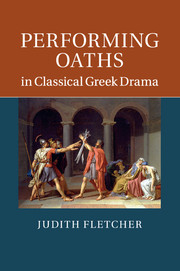Book contents
- Frontmatter
- Contents
- Acknowledgments
- A note on abbreviations
- Introduction
- Chapter 1 From curses to blessings: horkos in the Oresteia
- Chapter 2 Speaking like a man: oaths in Sophocles’ Trachiniae and Philoctetes
- Chapter 3 Horkos in the polis: Athens, Thebes and Sophocles
- Chapter 4 Perjury and other perversions: Euripides’ Phoenissae, Orestes and Cyclops
- Chapter 5 Twisted justice in Aristophanes’ Clouds
- Chapter 6 Women and oaths in Euripides
- Chapter 7 How to do things with Euripides: Aristophanes’ Thesmophoriazusae
- Chapter 8 Swearing off sex: the women's oath in Aristophanes’ Lysistrata
- Conclusion
- Bibliography
- Index locorum
- General index
Chapter 7 - How to do things with Euripides: Aristophanes’ Thesmophoriazusae
Published online by Cambridge University Press: 05 December 2011
- Frontmatter
- Contents
- Acknowledgments
- A note on abbreviations
- Introduction
- Chapter 1 From curses to blessings: horkos in the Oresteia
- Chapter 2 Speaking like a man: oaths in Sophocles’ Trachiniae and Philoctetes
- Chapter 3 Horkos in the polis: Athens, Thebes and Sophocles
- Chapter 4 Perjury and other perversions: Euripides’ Phoenissae, Orestes and Cyclops
- Chapter 5 Twisted justice in Aristophanes’ Clouds
- Chapter 6 Women and oaths in Euripides
- Chapter 7 How to do things with Euripides: Aristophanes’ Thesmophoriazusae
- Chapter 8 Swearing off sex: the women's oath in Aristophanes’ Lysistrata
- Conclusion
- Bibliography
- Index locorum
- General index
Summary
Aristophanes was an acute and amused observer of Euripides’ engagement with the programmatic and the textual properties of the oath. In 411 bce, shortly after the production of Iphigenia in Tauris he capped the tragic poet with his Thesmophoriazusae, arguably the funniest, and certainly the most complexly intertextual of his productions. Taking full advantage of comic license he transports Euripides, or rather an eidolon of Euripides, into the theater of Dionysus, where the tragedian not only becomes a character in Aristophanes’ comedy, but also swears an oath that forces him to take the male roles in some outrageous mutations of his own tragedies. Influenced perhaps by the chorus of Athenian women in the recent production of Euripides’ Ion (1090–1105), or even by the earlier chorus of Medea, who had complained about their representation by male poets (423–9), Aristophanes brings these querulous women to life, and instills in them a desire for revenge to be planned at the Thesmophoria now in progress. Their wrath, as it turns out, is less about being falsely maligned than it is about having all their secret vices revealed. They are of course products of the same male-authored tradition that the Euripidean choruses objected to. My purpose in this chapter is to explore how the oath sworn in the prologue of the comedy generates a script that is constructed as a parodic pastiche of recent Euripidean productions. This oath is sworn by a male character to a female character, a device that Euripides used to complicate his plotlines, as we saw in the preceding chapter. In the comic theater, however, this female agency becomes distorted by overt citations of the transvestism of the actors who play female roles.
Becoming a woman
As the play opens, the women of Athens are poised to exact their penalty on Euripides, who has been informed that an assembly to deliberate about his punishment is about to begin. In characteristic Aristophanic fashion Euripides concocts his Great Idea: a volunteer disguised as a woman will infiltrate this exclusively female festival and rescue Euripides from sure death. The tragic poet Agathon, who shaved his beard and composed “feminine” tragedies (and therefore must, by comic logic, be womanish himself), would be ideal, but he is not especially keen to help out. He offers some of the necessary accoutrements that Euripides uses to dress his sidekick, named only as “Inlaw,” as a woman. The preparation of Inlaw can be read as an allusion to the practice of using male actors for female roles in Athenian theater. However, Euripides is not just transforming his actor into any “woman”; he is turning him into a female character who will eventually take on specific roles from Euripidean tragedies.
- Type
- Chapter
- Information
- Performing Oaths in Classical Greek Drama , pp. 203 - 219Publisher: Cambridge University PressPrint publication year: 2011



